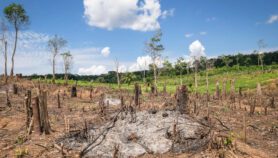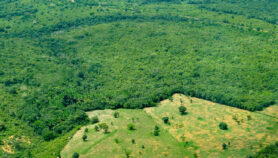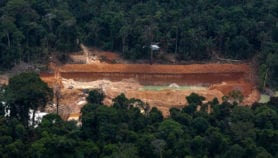By: Hawk Jia
Send to a friend
The details you provide on this page will not be used to send unsolicited email, and will not be sold to a 3rd party. See privacy policy.
[Beijing] The rapid destruction of the world’s rainforests could be reduced using financial incentives from carbon trade, according to a new World Bank report.
The report, released on Monday (23 October), suggests that industrialised nations offset their emissions of carbon dioxide by funding projects that reduce deforestation in developing countries.
Carbon trade is a mechanism developed to reduce global emissions of carbon dioxide, the major greenhouse gas leading to global warming. Under the mechanism, industrialised countries pay developing nations for reducing the latter’s carbon dioxide emissions.
Studies have found that forests can store large amounts of carbon dioxide; the World Bank report estimates that deforestation accounts for 20 per cent of emissions of the gas worldwide annually.
It also estimates that five per cent of the world’s rainforests is lost each decade.
In many parts of the developing world, dense tropical forest is cleared to create pastures worth as little as US$300 a hectare, while the forest could be compensated with thousands of dollars if it were used for storing carbon dioxide through carbon trading, according to the report.
“Global carbon finance can be a powerful incentive to stop deforestation,” says World Bank economist François Bourguignon.
“Compensation for avoiding deforestation could help developing countries to improve forest governance and boost rural incomes, while helping the world at large to mitigate climate change more vigorously.”
The report says that the potential benefits of using forests to store carbon dioxide have not been explored by the current carbon market, and urges for sustainable forest management to be integrated into the global strategy for reducing greenhouse gas emissions.
But Lu Wenming, a senior researcher at the Chinese Academy of Forestry, warns that the introduction of forest preservation into the carbon market could be impeded by difficulties in evaluating the exact amount of carbon dioxide that a forest can store.
For the forest resources to be effectively integrated into a strategy to reduce global carbon dioxide emissions, governments, international organisations, industries and forest communities must work together to create the appropriate policies, Lu told SciDev.Net.












